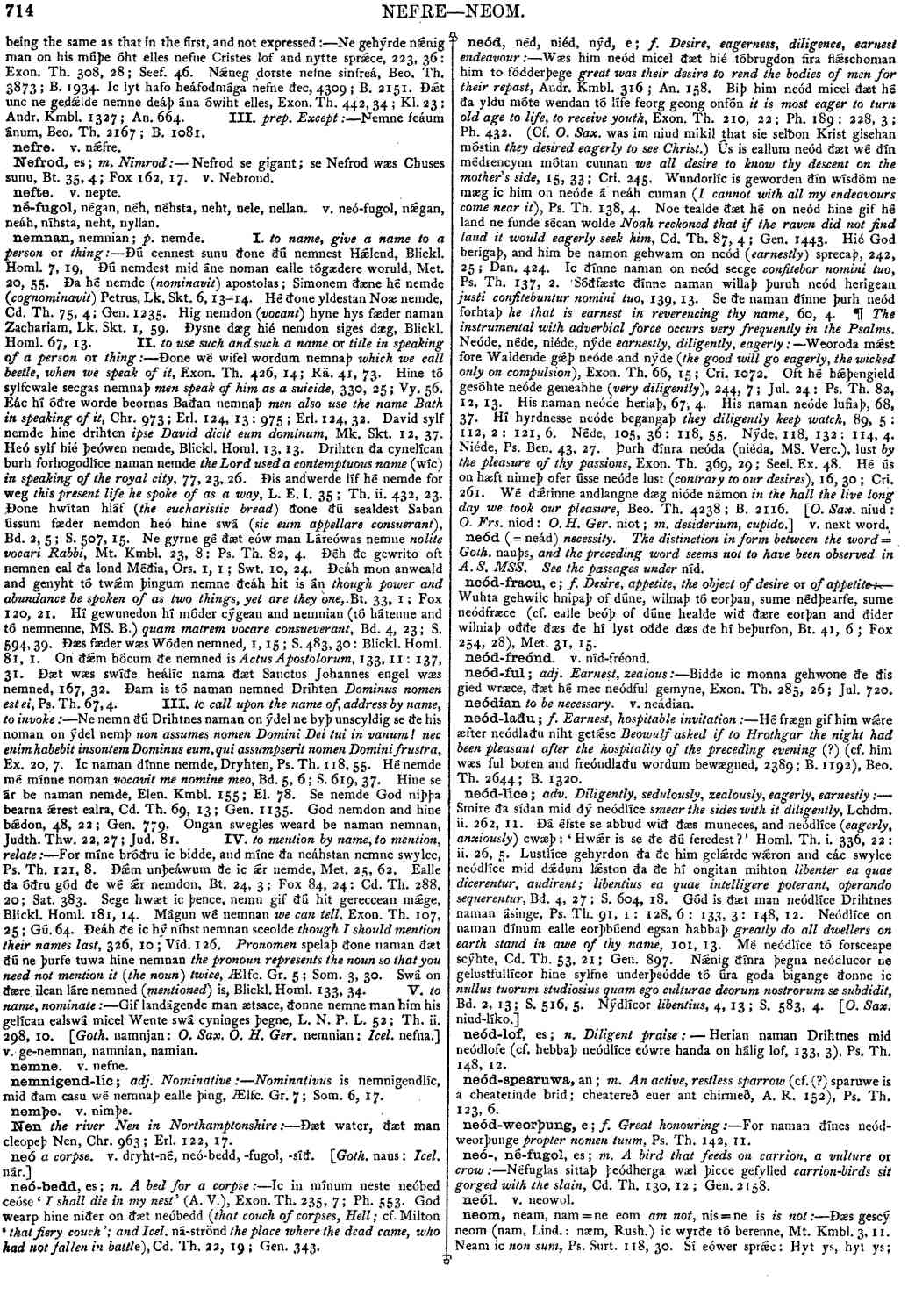neód
- noun [ feminine ]
-
Wæs him neód micel ðæt hié tóbrugdon fira flǽschoman him to fódderþege
great was their desire to rend the bodies of men for their repast,
- Andr. Kmbl. 316 ;
- An. 158.
-
Biþ him neód micel ðæt hé ða yldu móte wendan tó lífe feorg geong onfón
it is most eager to turn old age to life, to receive youth,
- Exon. Th. 210, 22 ;
- Ph. 189 : 228, 3 ;
- Ph. 432.
(Cf. O. Sax. was im niud mikil that sie selƀon Krist gisehan móstin they desired eagerly to see Christ.) -
Ús is eallum neód ðæt wé ðín médrencynn mótan cunnan
we all desire to know thy descent on the mother's side,
- 15, 33 ;
- Cri. 245.
-
Wundorlíc is geworden ðín wísdóm ne mæg ic him on neóde á neáh cuman (
I cannot with all my endeavours come near it
),- Ps. Th. 138, 4.
-
Noe tealde ðæt hé on neód hine gif hé land ne funde sécan wolde
Noah reckoned that if the raven did not find land it would eagerly seek him,
- Cd. Th. 87, 4 ;
- Gen. 1443.
-
Hié God herigaþ, and him be namon gehwam on neód (
earnestly
)sprecaþ,
- 242, 25 ;
- Dan. 424.
-
Ic ðínne naman on neód secge
confitebor nomini tuo,
- Ps. Th. 137, 2.
-
Sóðfæste ðínne naman willaþ þuruh neód herigean
justi confitebuntur nomini tuo,
- 139, 13.
-
Se ðe naman ðínne þurh neód forhtaþ
he that is earnest in reverencing thy name,
- 60, 4. ¶
-
The instrumental with adverbial force occurs very frequently in the Psalms.
Neóde, néde, niéde, nýde
earnestly, diligently, eagerly:
-- Weoroda mǽst fore Waldende gǽþ neóde and nýde
(the good will go eagerly, the wicked only on compulsion ),
- Exon. Th. 66, 15 ;
- Cri, 1072.
-
Oft hé hǽþengield gesóhte neóde geneahhe (
very diligently
),- 244, 7 ;
- Jul. 24 : Ps. Th. 82, 12, 13.
-
His naman neóde heriaþ,
- 67 ;
- 4 .
-
His naman neóde lufiaþ,
- 68, 37.
-
Hí hyrdnesse neóde begangaþ
they diligently keep watch,
- 89, 5 : 112, 2 : 121, 6.
-
Néde,
- 105, 36 : 118, 55.
-
Nýde,
- 118, 132 : 114, 4.
-
Niéde,
- Ps. Ben. 43, 27.
-
Þurh ðínra neóda (niéda, MS. Verc.), lust
by the pleasure of thy passions,
- Exon. Th. 369, 29 ;
- Seel. Ex. 48.
-
Hé ús on hæft nimeþ ofer ússe neóde lust (
contrary to our desires
),- 16, 30 ;
- Cri. 261.
-
Wé ðǽrinne andlangne dæg nióde namon
in the hall the live long day we took our pleasure,
- Beo. Th. 4238 ;
- B. 2116.
Bosworth, Joseph. “neód.” In An Anglo-Saxon Dictionary Online, edited by Thomas Northcote Toller, Christ Sean, and Ondřej Tichy. Prague: Faculty of Arts, Charles University, 2014. https://bosworthtoller.com/23554.
Checked: 1